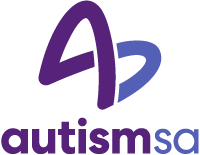Hannah Neale is a 25-year-old professional whose younger brother, Tom, was diagnosed with autism when they were children.
Having worked in an autism support role, as well as growing up with a brother who has autism, we spoke to Hannah about her personal experience, how people’s understanding of autism has changed, and what she want’s people to understand about the spectrum.
When did you find out that your brother Tom had autism?
My brother Tom is 21 now but was diagnosed with autism when he was three years old. I was 7 when he was diagnosed and remember coming into the lounge room and seeing mum hysterically crying on the couch.
He’d been getting tests and things, so I knew something was up, but from her reaction I thought he was going to die. That’s when she told us he had been diagnosed with autism.
How did you and your family feel about the diagnosis?
It was a really emotional time, I knew Tom was different, he couldn’t talk, and clapped his hands a lot, but I didn’t really know what autism was until mum gave it a name.
Because none of us really knew what autism was, or what it meant, we saw it as a real deficit at the time, it was all very doom and gloom for a while there. We were mortified, upset, and for a long time none of us could even say the word “autism”.
I’m 25 now and have just finished working at Autism SA in a senior management role, supporting families who have received an early diagnosis of autism for a child or sibling.
How have people’s perceptions of autism changed over the years?
It’s interesting how the narrative has changed in such a short time, nine out of ten parents who have received a diagnosis are much more hopeful about it now, they know what to expect and they know they’ll be fine, because there is funding, and there are services and there’s a support network there to help them through it.
Often times, it’s the diagnosis people hope for, it’s preferable over something more debilitating. Many people with autism live very long, full and amazing lives.
Because of that, the community focus is on what is possible now, through allied health services and early intervention. There’s a lot more acceptance, awareness and hope.
How did you talk to your brother about his diagnosis?
Tom has an intellectual disability as well as autism, so is lower functioning. Because of this it was hard to talk to Tom about his autism early on. When he was about 10 years old we decided it would be important to explain autism to him, before other people, or kids started to.
We started with the positives, focusing on how he’s really good at remembering all of these crazy facts, then started talking about some of his challenges, then linked those behaviours to his autism diagnosis.
How do you talk to other people about autism?
It’s much easier these days, everyone knows what autism is, so there’s not so much to explain. Having said that, because so many people are aware of autism, there are also a number of stereotypes. I find I’m constantly having to educate people about autism being a spectrum, and that every experience of autism is different, and everyone on the spectrum will be impacted in a different way.
Autism is very common now, and because of this a lot of people know someone on the spectrum and assume their experience is the same as everyone else’s. The hard thing with autism is that the spectrum is so broad – you can have someone on the mild side of things, who lives in their own home and has a job and a family; while another person could be on the severe end of the spectrum needs constant in-home care.
What advice would you give to a parent whose child has just been diagnosed with autism?
My one piece of advice to families of children who have received a diagnosis would be to try and look at your child the same way you always have. They’re the exact same person, they haven’t changed, and having autism is just one part of who they are. Try not to let the autism get in the way of your perception of them and focus on their strengths.


